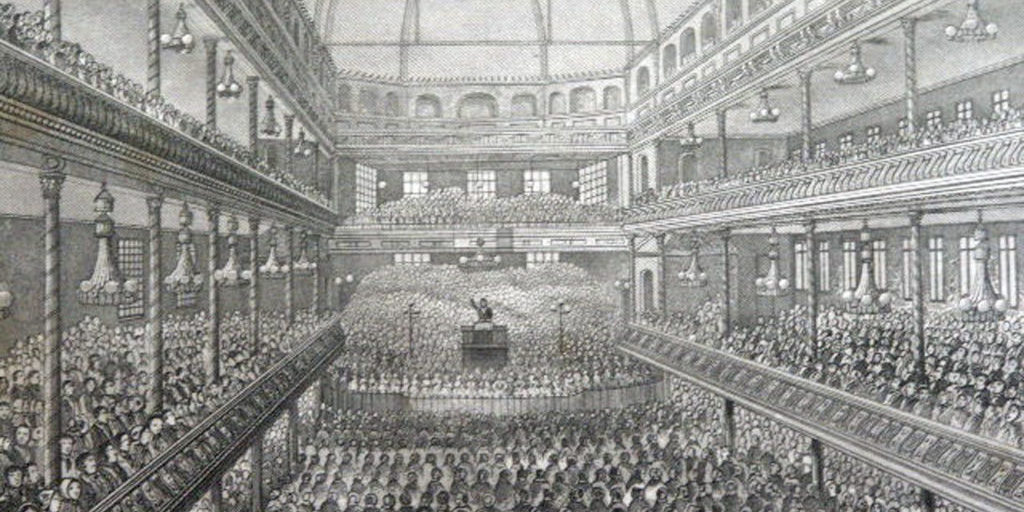
Why Pastors Should Engage Charles Spurgeon
Consecrate’: “1. To make sacred; to appropriate to sacred uses….2. To dedicate inviolably to some particular purpose or person.”[1]
Charles Haddon Spurgeon is an evangelical figure of titanic proportions, and the more one knows about his life the more incredible it becomes. I first met Spurgeon while working at The Spurgeon Library in 2015 and I have long since been convinced that Carl F. H. Henry was right to call him “one of evangelical Christianity’s immortals.”[2] Consider his founding of sixty-six parachurch ministries,[3] the translation of his sermons into nearly forty languages,[4] that his first biography was published when he was only twenty-two years old,[5] or that he was the “exemplar par excellence of Evangelicalism” and “the embodiment of evangelical virtue.”[6] Any one of these would make Spurgeon’s legacy significant but it is their coalescence which makes him immortal. However, the reason why you should engage Charles Haddon Spurgeon is because he was a man wholly consecrated unto God.
Spurgeon believed that it was the solemn duty of the Christian to be “given up to God, and to God alone.”[7] His “deepest wish” in life, and in death, was a “Complete consecration of every faculty of mind and body unto the Lord,”[8] a consecration that was both Christocentric and cruciform. For Spurgeon, the “blood of Jesus” was so powerful and precious that it “[inflamed] the heart with fervent love” and “[lead] men to high deeds of consecration, self-denial, and self-sacrifice.”[9] Such was the majesty of the “amazing love that bled upon the tree.”[10] Accordingly, Spurgeon believed that “self-denial” and “consecration” were among “the highest of Christian virtues.”[11] And so, he charged “each Christian to be doing everything that he can for his Lord, for his church, and for perishing sinners.”[12] In short, “Personal consecration is the demand of the age.”[13]
A Consecrated Life – Zeal in Service
Spurgeon’s life was marked by consecration to God through his unceasing service for the Lord Jesus Christ. Click To Tweet From the moment of his new birth he knew that his life was no longer his own. In fact, he said:
In that day when I surrendered myself to my Saviour, I gave Him my body, my soul, my spirit; I gave Him all I had, and all I shall have for time and for eternity. I gave Him all my talents, my powers, my faculties, my eyes, my ears, my limbs, my emotions, my judgment, my whole manhood, and all that could come of it.[14]
And while history remembers the Spurgeon who founded the sixty-six parachurch ministries and whose sermons were translated into nearly forty languages, the sixteen-year-old boy from Essex cut his teeth by distributing tracts and “telling, in humble language, the things of the Kingdom of God.”[15]
Spurgeon’s aspiration was not acclaim, success, or institutional clout, he just wanted to faithfully serve the Saviour of his soul. Young Spurgeon was timid, in fact he said “I might have done nothing for Christ if I had not been encouraged by finding myself able to do a little.”[16] For Spurgeon, passing out tracts was a “first step” which lead to “something more, and from that something more” hoping all the while “to be made extensively useful for God.”[17] Indeed, consecration began with the “little” things, not the “great” things, just as “One who is faithful in a very little is also faithful in much” (Luke 16:10 ESV).
One sign that Spurgeon would soon become “faithful in much” was that he “could scarcely content myself even for five minutes without trying to do something for Christ.”[18] He knew that “nobody gets on in the world who is half-hearted”[19] and so he asked “If sinners are zealous in their sins, should not saints be zealous for their God?”[20]
For Spurgeon, gracious gratitude was the fountain of obedience. His zeal for Christ was fueled by looking to Christ, who was not only the King of kings and the Lord of lords, but also “the lord of grief” and “the emperor of anguish.”[21] When Spurgeon looked to the cross, where Christ suffered for his sin, he exclaimed “let us admire the superlative love of Jesus. O love, love, what hast thou done!”[22] For Spurgeon, the cross, and all that it entailed, inflamed his zeal and provided a foundation of grace so that he could say:
When you work for God you do not work for life but from life. You do not try to serve Christ in order that you may be saved, but because you are saved. You do not obey his commands that ye may become his children, but because you are his children.[23]
A Consecrated Mind – Theological Integrity
While Spurgeon’s life was marked by consecration to God through zealous service, his mind was consecrated to God through theological integrity. However, this theological integrity would come at a high cost. Spurgeon knew that making “a decision for truth” entailed a “corresponding protest against error,”[24] and protest he did.
Over the course of his thirty-eight year ministry in London, Spurgeon had to battle his way through three major controversies: The Rivulet Controversy of 1856,[25] the Baptismal Regeneration Controversy of 1864,[26] and finally the Down-Grade Controversy which erupted in 1887.[27] Indeed, it would be this third, and final, controversy which Spurgeon’s wife Susannah said was the “deepest grief”[28] of his noble heart and which “cost him his life.”[29]
In Spurgeon’s view, the Down-Grade arose due to the importation of the higher-critical method from the continent. He lamented that “Germany was made unbelieving by her preachers and England is following in her track.”[30] Documenting the theological decline, Spurgeon observed that:
A new religion has been initiated, which is no more Christianity than chalk is cheese….The Atonement is scouted, the inspiration of Scripture is derided, the Holy Spirit is degraded into an influence, the punishment of sin is turned into fiction, and the resurrection into a myth.[31]
Spurgeon was bold and tenacious in his denunciation of the “modern thought” behind the Down-Grade precisely because it was gutting churches. He knew that when scholars attacked the authority, inerrancy, infallibility, and sufficiency of God’s Word they were in effect “striking at the life of our religion” and “tearing out its heart.”[32] Although the controversy would lead to his withdrawal from,[33] and subsequent censure by,[34] the Baptist Union, Spurgeon knew that the battle for the Bible was “the Thermopylae of Christendom”[35] and so he resolved:
If for a while the evangelicals are doomed to go down, let them die fighting, and in the full assurance that their gospel will have a resurrection when the inventions of ‘modern thought’ shall be burned up with fire unquenchable.[36]
A Post-Script
Spurgeon once declared that “I would fling my shadow through eternal ages if I could,”[37] and I believe that this shadow has come to us through his legacy. Henry was certainly right to call him “immortal” but I believe that Spurgeon’s enduring influence will be found in his convictions, treasured beliefs girded by his consecration to God. Pastor, you and I will not found sixty-six parachurch ministries, see our sermons translated into forty languages, or have biographies written about us, let alone at age twenty-two. But, we can cherish the Biblical convictions which compelled Spurgeon in his ministry, and we can seek to live wholly consecrated unto God. Indeed, may we say with Spurgeon:
I feel an all-controlling, overwhelming influence which constrains me at all times in every place to be about my Father’s business; the spirit of high, holy, entire, sincere, determined consecration in heart to God.[38]
Endnotes
[1] Samuel Johnson, A Dictionary of the English Language: In Which the Words are Deduced from Their Originals, and Illustrated in Their Different Significations by Examples from the Best Writers. To Which Are Prefixed, A History of the Language, and an English Grammar. In Two Volumes – Vol. I. (6th ed.; London: Printed for J., F., and C. Rivington, et. al., 1783, The Spurgeon Library), s.v. “Consecrate”.
[2] Carl F. H. Henry quoted in Lewis Drummond, Spurgeon: Prince of Preachers (3rd ed.; Grand Rapids, MI: Kregel, 1992), 11.
[3] C. H. Spurgeon, ed., Sword and Trowel; A Record of Combat with Sin & Labour for the Lord. 37 Vols. (London: Passmore and Alabaster, 1865-1902), July 1884:373 (see also, Marianne Farningham, Spurgeon: The People’s Preacher [London: Walter Scott Publishing Co., n.d.], 251-52).
[4] C.H. Spurgeon, C.H. Spurgeon’s Autobiography. Compiled from His Diary, Letters, and Records, by His Wife, and Private Secretary. 4 Vols. (London: Passmore and Alabaster, 1897-1900), 4:291.
[5] E. L. Magoon, “The Modern Whitefield.” Sermons of the Rev. C. H. Spurgeon, of London; With an Introduction and Sketch of His Life (New York: Sheldon, Blakeman, and Company, 1857).
[6] Phillip Ort, Timothy Gatewood, and Ed Romine, “Charles Spurgeon: The Quintessential Evangelical,” in Midwestern Journal of Theology 18:1 (Spring 2019), 104-25; 106.
[7] C. H. Spurgeon, The New Park Street Pulpit: Containing Sermons Preached and Revised by the Rev. C. H. Spurgeon, 6 Vols. (Pasadena, TX: Pilgrim Publications, 1970-2006), 4:479.
[8] C. H. Spurgeon, The Metropolitan Tabernacle Pulpit: Sermons Preached and Revised by C.H. Spurgeon. Vols. 7-63 (Pasadena, TX: Pilgrim Publications, 1970-2006), 24:229.
[9] Ibid., 20:452.
[10] Ibid.
[11] Ibid., 10:714.
[12] Ibid., 19:559.
[13] Ibid.
[14] Autobiography 1:180.
[15] Ibid.
[16] Ibid.
[17] Ibid.
[18] Ibid.
[19] MTP 25:79.
[20] Ibid., 11:389-390.
[21] Ibid., 19:126.
[22] Ibid., 131.
[23] Ibid., 23:87.
[24] ST September 1887:465.
[25] See Thomas T. Lynch, The Rivulet: A Contribution to Sacred Song (2nd ed.; London: Longman, Brown, Green, and Longmans, 1856); see also Autobiography 2:260-69.
[26] See Edward Bouverie Pusey, Tract for the Times by Members of the University of Oxford. No. 67: Scriptural Views of Holy Baptism (2nd ed.; London: J .G. F. & J. Rivington: Oxford: J. H. Parker, 1840), 4. For Spurgeon’s response see “Baptismal Regeneration,” MTP 10:313-28.
[27] ST August 1887:397.
[28] Autobiography 4:255.
[29] Ibid.
[30] ST August 1887:399.
[31] Ibid.
[32] Ibid., June 1888:259.
[33] Ibid., November 1887:558-560.
[34] Ibid., February 1888:81.
[35] Ibid., May 1888:205.
[36] Ibid., August 1887:400.
[37] W. A. Fullerton, C. H. Spurgeon: A Biography (London: Williams and Norgate, 1920), 181.
[38] NPSP 3:121-122.

